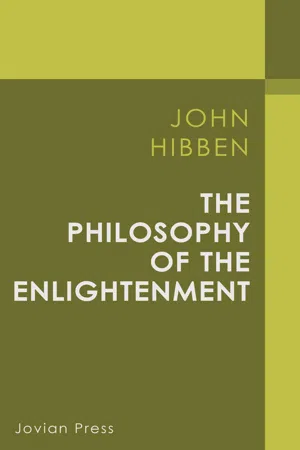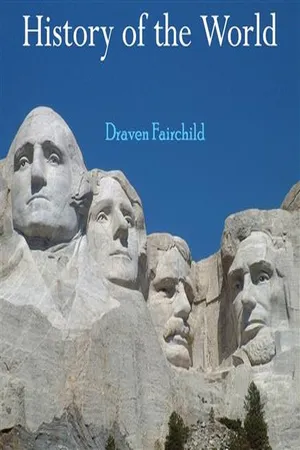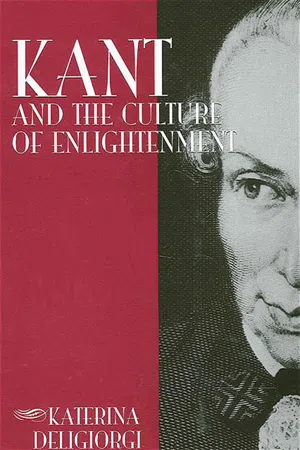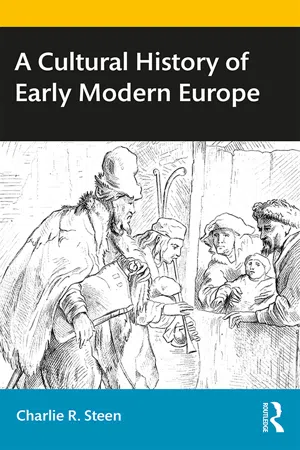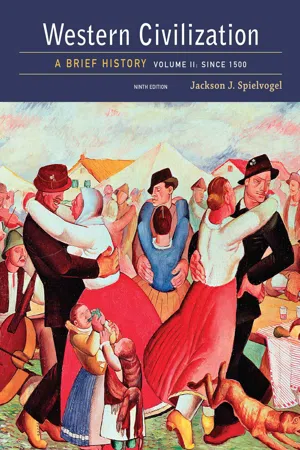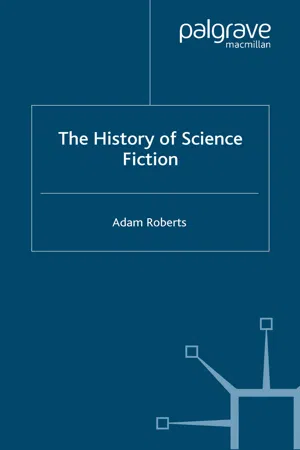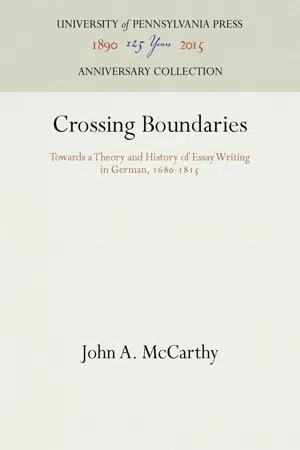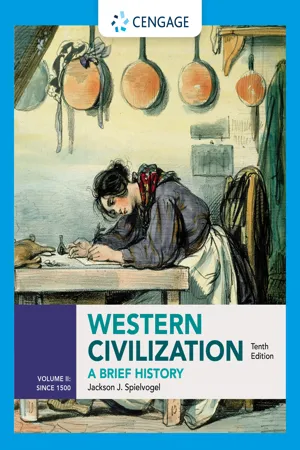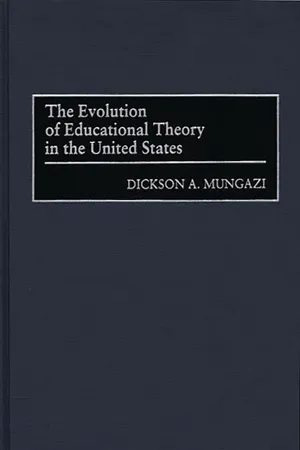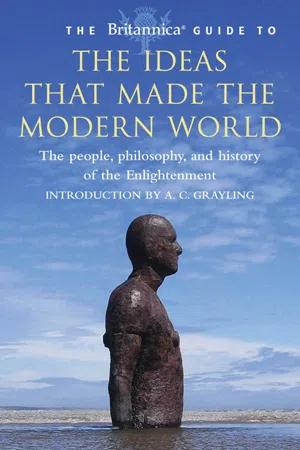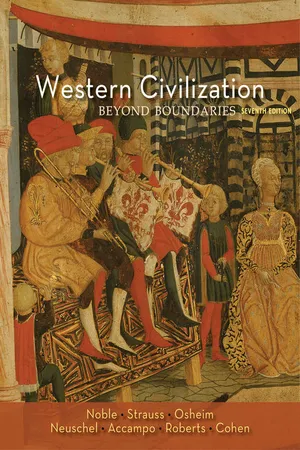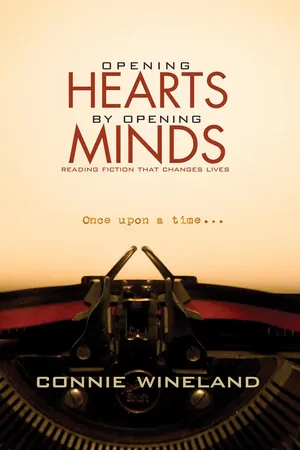Literature
Age of Enlightenment
The Age of Enlightenment, also known as the Age of Reason, was an intellectual and cultural movement in the 18th century that emphasized reason, science, and individualism over tradition and authority. It had a profound impact on literature, promoting the use of rationality, empirical evidence, and critical thinking in literary works. Writers during this period often sought to challenge established norms and explore new ideas through their writing.
Written by Perlego with AI-assistance
Related key terms
1 of 5
12 Key excerpts on "Age of Enlightenment"
- eBook - ePub
- John Hibben(Author)
- 2018(Publication Date)
- Jovian Press(Publisher)
THE AGE OF THE ENLIGHTENMENT
~THE SIGNIFICANT MOVEMENT OF THOUGHT known as the Enlightenment, or Aufklärung, falls in the main within the period of the eighteenth century. It is seldom, however, that the turn of a century happens to coincide exactly with the beginning or the end of a great epoch, either political, religious or philosophical. The period in philosophy which is referred to in a general way as the eighteenth century begins virtually in the year 1690 with the publication of Locke famous Essay Concerning Human Understanding, and is brought to its close in the year 1781 with the appearance of Kant Critique of Pure Reason. They are the natural boundaries of this “philosophical century.”It was an age characterised by a restless spirit of inquiry — a century of challenge. A new life was awake and stirred in the minds of men. Traditions which had been long venerated became the objects of searching investigation and criticism. The authority of the church, of the state and of the school was no longer regarded as the court of last appeal. The old beliefs which failed to justify themselves at the bar of reason were discarded. The foundations of time-honoured systems seemed shifting and uncertain. There was an insistent demand for the free play of the individual judgment. There was, also, a constant reference to the light of reason, the inner illumination shining bright and clear in contrast to the shadows of mysticism, or to the false and flickering light of dogmatism. Hence the name of the age of illumination, or enlightenment, — the name, also, of the age of reason.In this period there was more particularly a spirit of protest against metaphysical speculation, that is, against all attempts to explain the phenomena of human existence in any manner which transcends the ordinary processes of reason, and consequently possesses no firm foundation of reality. And reality, in turn, was conceived as that which is akin to nature and to the general course of natural phenomena as perceived through the channels of the various senses. There was an attempt to reduce the problems of thought to the basis of extreme simplicity, and to make a common-sense view of things everywhere prevail. - No longer available |Learn more
- (Author)
- 2014(Publication Date)
- Learning Press(Publisher)
Western transformations Reason and Enlightenment Traditionally, the European intellectual transformation of and after the Renaissance bridged the Middle Ages and the Modern era. The Age of Reason in the Western world is generally regarded as being the start of modern philosophy, and a departure from the medieval approach, especially Scholasticism. Early 17th century philosophy is often called the Age of Rationalism and is considered to succeed Renaissance philosophy and precede the Age of Enlightenment, but some consider it as the earliest part of the Enlightenment era in philosophy, extending that era to two centuries. The 18th century saw the beginning of secularization in Europe, rising to notability in the wake of the French Revolution. The Age of Enlightenment is a term used to describe a time in Western philosophy and cultural life centered upon the 18th century, in which reason was advocated as the primary source and legitimacy for authority. Developing more or less simultaneously in many parts of Europe and America. Developing during the Enlightenment era, Renaissance humanism was an intellectual movement spread across Europe. The basic training of the humanist was to speak well and write (typically, in the form of a letter). The term umanista comes from the latter part of the 15th century. The people were associated with the studia humanitatis , a novel curriculum that was competing with the quadrivium and scholastic logic. Renaissance humanism took a close study of the Latin and Greek classical texts, and was antagonistic to the values of scholasticism with its emphasis on the accumulated commentaries; and humanists were involved in the sciences, philosophies, arts and poetry of classical antiquity. They self-consciously imitated classical Latin and deprecated the use of medieval Latin. By analogy with the perceived decline of Latin, they applied the principle of ad fontes , or back to the sources, across broad areas of learning. - eBook - PDF
- Katerina Deligiorgi(Author)
- 2012(Publication Date)
- SUNY Press(Publisher)
Chapter 1 The Enlightenment in Question 1. Enlightenment as an “Age of Criticism” One of the difficulties encountered when reflecting about the Enlightenment is to determine first of all what the object is. This is not just a demand for geographical and historical precision, but also, importantly, for identifying the set of ideas under discussion, the con- tent so to speak of the term. But therein lies the difficulty: “Enlightenment” is descriptively elusive. There is no date or concept that we can afford to take as our unproblematic, self-evident starting point. Taking our cue from the darkness-dispelling metaphor that is Enlightenment, however, we can begin by asking: How are darkness and light apportioned? How is illumination to be brought about? In terms of what we have come to view as the characteristic concerns and ambitions of the “Age of Reason,” the answer to these questions is obvious: the way to secure intellectual progress and human happiness is by eradicating superstition and by setting the various branches of human knowledge on a sound scientific footing. Familiarity with the aspirations of this optimistic, progress-oriented Enlightenment, how- ever, has tended to obscure a strand of eighteenth-century thinking that offers a more cautious view of the future and questions the nature and achievements of both “enlightenment” and “civilization.” The aim of this chapter is to flesh out the questions this critical Enlightenment raises about the social and cultural context of reasoning, the reliability of reason as a guide for human action, and, finally, the nature, powers, and limitations of human rationality. In his now classic study of the period, The Philosophy of the Enlightenment, Ernst Cassirer observes that “‘Reason’ becomes the 13 - eBook - ePub
- Charlie R. Steen(Author)
- 2019(Publication Date)
- Routledge(Publisher)
7 The culture of the Age of Reason, 1740–1784 Events and people The decades of the height of the Enlightenment produced individuals in cultural life who associated themselves with having reason as a guide for all human endeavors. The intellectual and cultural burst of activity affected Europe and the American colonies but proved incapable of transforming the social and political order and faced significant opposition from established churches. Consequently, people advanced ideas encouraging personal freedom and human rights in an environment of repression rooted in archaic practices and beliefs. New philosophy collided with old traditions. The brilliance of the art and music and the vitality of theatrical performances captivated audiences just as the literature of fact and fiction did. Powerful poetry, engaging novels, and a vast range of personal records of life and travel revealed a vigorous civilization. Sadly, the beauty and enthusiasm of the culture contrasted with dynastic politics that indulged in repressive measures and increasingly frightful and costly wars. Those contradictions made the period uneasy and uncertain for many of its most creative citizens. Johann Winckelmann (1717–1768). As a student in Germany he studied both science and the art of the classical world. After moving to Rome, Winkelmann became instrumental in developing archaeology as a scientific investigation of the past while also advancing the aesthetic appreciation of antiquity that became important after 1750. He wrote on the art and architecture of Greece and Rome, and openly advocated imitating their principles and techniques. He strengthened the existing place of classicism in creative life with his History of the Art of Antiquity that summarized the attitudes of neoclassicism with its insistence on simplicity in form and avoidance of ornamentation - eBook - PDF
Western Civilization
A Brief History, Volume II: Since 1500
- Jackson Spielvogel(Author)
- 2016(Publication Date)
- Cengage Learning EMEA(Publisher)
For most of the philosophes, “enlightenment” included the rejection of traditional Christianity. The religious wars and intolerance of the sixteenth and seventeenth centuries had so alienated intellectuals that they were open and even eager to embrace the new ideas of the Scientific Revolution. Whereas the great scientists of the seventeenth century believed that their work exalted God, the intellectuals of the eighteenth century read those scientific conclusions a different way and increasingly turned their backs on Christian orthodoxy. Consequently, European intellectual life in the eighteenth century was marked by the emergence of the secularization that has characterized the modern Western mentality ever since. Ironically, at the same time that reason and materialism were beginning to replace faith and worship, a great outburst of religious sensibility manifested itself in music and art. Clearly, the growing secularization of the eighteenth century had not yet captured the hearts and minds of all European intellectuals and artists. The Enlightenment Q F OCUS Q UESTIONS : What intellectual developments led to the emergence of the Enlightenment? Who were the leading figures of the Enlightenment, and what were their main contributions? In what type of social environment did the philosophes thrive, and what role did women play in that environment? In 1784, the German philosopher Immanuel Kant ( i-MAHN-yoo-el KAHNT ) (1724–1804) defined the Enlightenment as “man’s leaving his self-caused immaturity.” Whereas earlier periods had been handi-capped by the inability to “use one’s intelligence with-out the guidance of another,” Kant proclaimed as the motto of the Enlightenment: “Dare to know! Have the courage to use your own intelligence!” The eighteenth-century Enlightenment was a movement of intellec-tuals who dared to know. - eBook - PDF
- A. Roberts(Author)
- 2005(Publication Date)
- Palgrave Macmillan(Publisher)
Jonathan Rée expresses a very salutary suspicion of the habit of dividing history into neat cultural periods (‘the Middle Ages, Renaissance, Romanticism, Modernism and so on’). But even Rée concedes that various different forms of ‘period thinking’ all acknowledge that a key epistemic shift happened in the eighteenth century. There might be dozens of alternative histories of the present age, but they all intersected at some point in the 18th century known as the Age of Reason, or more vividly the Enlightenment (or les siècle des lumières, die Aufklärung or l’illuminismo). Essentially the Enlightenment was taken to be Europe’ s concerted effort to cleanse itself of the last residues of barbarism and medieval superstition and replace them with liberalism, science and secular philosophy. (Rée, p. 21) Rée’ s portrait is a deliberately simplified account of a complex period, but it pinpoints the extent to which the cultural logic broadly associated with the Enlightenment included an openness to rational, logical frames of thought that facilitated speculative and ‘scientific’ fictions, leading to works that modern readers of SF are more likely to recognise as consonant with the protocols of the genre as they understand it. One crucial reason for this was the fact that (to quote A. J. Meadows) ‘the early eighteenth century saw an almost universal acceptance of a belief in a plurality of worlds’ (Meadows, p. 126). Meadows’ ‘universal’ means universal among scien- tists; nevertheless this is a vital staging-post in the development of the genre. As I have argued, it is easy to underestimate the significance of this theocracy-eroding belief. Theologically speaking, it can lead believers away from the Trinity and towards Deism. Culturally , it opens the cosmos as a material space, available to the imaginative explorations and colonisations we call SF. - eBook - PDF
Crossing Boundaries
Towards a Theory and History of Essay Writing in German, 168-1815
- John A. McCarthy(Author)
- 2016(Publication Date)
In literary and intellectual histories well into our century, for example, appreciation for the accomplishments of the Age of Reason suffered from a generally bad press. The bias toward Classicism and Romanticism prevented an objective evaluation of the intellectual climate from which both later movements drew inspiration. Even Ernst Cassirer's judicious assessment in his celebrated The Philosophy of the Enlighten-ment (1932; English trans. 1955) was not enough to stem the tide. There was obviously a need to explain what true Enlightenment was and is. A concerted effort to amend the inherited, simplified view of the Enlightenment movement began in the late 1960s and has continued into the 1980s. The major impetus for the renewed interest was imparted by Horkheimer and Adorno themselves. A turning point toward a more positive attitude vis-ä-vis the significance of the European Enlightenment is reached in the work of such intellectual and cultural historians as Peter Gay, Klaus Epstein, Norman Hampson, Reinhart Koselleck and Jürgen Habermas during the 1960s. 5 They tended to stress the complexity of the European phenomenon in social, political, and philosophical terms with-out losing sight of its deeper roots reaching back to the Renaissance and Greek and Roman antiquity. During the 1970s the focus was narrowed The World of Eighteenth-Century Thought 71 to the specific situation in Austria and Germany between approximately 1680 and 1800 (e.g., Vierhaus, Pütz, and Schneiders). Of pivotal impor-tance in our context is the study by Werner Schneiders, Die wahre Auf-klärung (True Enlightenment, 1974). 6 The study is seminal for at least two reasons. First, it was conceived as a direct response to wide-spread misconceptions about the nature of the Enlightenment as well as about its historical configurations. Secondly, through its solid scholarship, objective tone, and clear writing, Die wahre Aufklärung became the new source of inspiration for subsequent inquir-ies. - eBook - PDF
Western Civilization
A Brief History, Volume II since 1500
- Jackson Spielvogel(Author)
- 2019(Publication Date)
- Cengage Learning EMEA(Publisher)
The Impact of Travel Literature Skepticism about both Christianity and European culture itself was nourished by travel reports. As we saw in Chapter 14, Europeans (the artists were high-strung and the philosophers talked too much), she set up separate meetings. Artists were invited only on Mondays; philosophers, on Wednesdays. These gatherings were among the many avenues for the spread of the ideas of the philos- ophes. And those ideas had such a widespread impact on their society that historians ever since have called the eighteenth century the Age of Enlightenment. For most of the philosophes, “enlightenment” included the rejection of traditional Christianity. The religious wars and intolerance of the sixteenth and seventeenth centuries had so alienated intellectu- als that they were open and even eager to embrace the new ideas of the Scientific Revolution. Whereas the great scientists of the seventeenth century believed that their work exalted God, the intellectu- als of the eighteenth century read those scientific conclusions a different way and increasingly turned their backs on Christian orthodoxy. Consequently, European intellectual life in the eighteenth century was marked by the emergence of the secularization that has characterized the modern Western mentality ever since. Ironically, at the same time that reason and materialism were beginning to replace faith and worship, a great outburst of religious sensibility manifested itself in music and art. Clearly, the grow- ing secularization of the eighteenth century had not yet captured the hearts and minds of all European intellectuals and artists. - Dickson Mungazi [Deceased], Dickson Mungazi(Authors)
- 1999(Publication Date)
- Praeger(Publisher)
3 Theory During the Revolutionary Period Knowledge is in every country the surest basis of public happiness. To the security of a free Constitution it contributes in various ways. —George Washington, 1790 THE INFLUENCE OF THE AGE OF REASON The American Revolution 1 was a result of developments that had been tak- ing place since the Renaissance. The leaders of the Revolution, George Washington, Thomas Jefferson, Benjamin Franklin, and many others, were the product of these developments. 2 These men lived during a period of time known as the Age of Reason, or the Enlightenment, 3 when man glorified the acquisition and application of reason as the most important mental skill they needed not just to lead a successful life, but also to influence society. The renewed interest in intellectual activity that came with the Renaissance gave people an opportunity to plan their own development. This develop- ment was evident in the literature that began to appear with the Renaissance and carried on into the Age of Reason. The Age of Reason was different from the Renaissance in one important respect—it produced a group of thinkers, artists, writers, and scholars who modeled their works after those of ancient Greek masters. In the process they attained a new level of clarity of both perception and articulation un- known in the past. 4 The literature that came out of the Age of Reason was far more powerful than that of earlier times in addressing critical issues. These neoclassicists totally rejected the notion that there was only one way of assessing the impact of religion, social events, and the political thought process. They even rejected the traditional authority that the church had ex- erted over many years. They rejected the thinking that a government in Eu- rope can continue to impose its own wishes on an unwilling people who were struggling for a new identity. They turned to the application of logic- eBook - PDF
- Encyclopaedia Britannica, Inc.(Authors)
- 2008(Publication Date)
- Encyclopaedia Britannica, Inc.(Publisher)
Particularly important were the writings of Locke, arguably the most important natural-law theorist of modern times, and the works of the 18th-THE AGE OF REVOLUTION: ENLIGHTENMENT POLITICS 171 century philosophes centred mainly in Paris, including Mon-tesquieu, Voltaire, and Jean-Jacques Rousseau. Locke argued in detail that certain rights self-evidently pertain to individuals as human beings (because these rights existed in ``the state of nature'' before humankind entered civil society); that chief among them are the rights to life, liberty (freedom from arbitrary rule), and property; that, upon entering civil society, humankind surrendered to the state ± pursuant to a ``social contract'' ± only the right to enforce these natural rights and not the rights themselves; and that the state's failure to secure these rights gives rise to a right to responsible, popular revolution. The philo-sophes, building on Locke and others and embracing many and varied currents of thought with a common supreme faith in reason, vigorously attacked religious and scientific dogmatism, intolerance, censorship, and social and eco-nomic restraints. They sought to discover and act upon universally valid principles governing nature, humanity, and society, including the inalienable ``rights of Man'', which they treated as a fundamental ethical and social gospel. Not surprisingly, this liberal intellectual ferment exerted a profound influence. Together with the Glorious Revolution in England (1688±9)and the resulting Bill of Rights, it provided the rationale for the wave of revolutionary agitation that swept the West, most notably in North America and France. - eBook - PDF
Western Civilization
Beyond Boundaries
- Thomas F. X. Noble, Barry Strauss, Duane Osheim, Kristen Neuschel(Authors)
- 2013(Publication Date)
- Cengage Learning EMEA(Publisher)
The exchange and spread of Enlightenment ideas, regardless of the method used, encouraged a The Growth of the Book Trade Book ownership dramatically increased in the eighteenth century, and a wide range of secular works—from racy novelettes to philosophical tracts—was available in print. In this rendering of a bookshop, shipments of books have arrived from around Europe. Notice the artist’s optimism in the great variety of persons, from the peasant with a scythe to a white-robed cleric, who are drawn to the shop by “Minerva” (the Roman goddess of wisdom). Musee des Beaux-Arts, Dijon/Giraudon/The Bridgeman Art Library *Quoted in Dena Goodman, The Republic of Letters: A Cultural History of the French Enlightenment (Ithaca, N.Y.: Cornell University Press, 1994), p. 89. Copyright 2012 Cengage Learning. All Rights Reserved. May not be copied, scanned, or duplicated, in whole or in part. Due to electronic rights, some third party content may be suppressed from the eBook and/or eChapter(s). Editorial review has deemed that any suppressed content does not materially affect the overall learning experience. Cengage Learning reserves the right to remove additional content at any time if subsequent rights restrictions require it. 522 Chapter 18 Europe on the Threshold of Modernity, ca. 1715–1789 type of far-reaching political debate that had never before existed, except possibly in seventeenth-century England. The greatest impact of the Enlightenment, particularly in France, was not the creation of any specific program for political or social change. Rather, its supreme legacy was an informed body of public opinion that could generate change. The Arts in the Age of Reason The Enlightenment reverberated throughout all aspects of cultural life. Just as the market for books and the read- ing public expanded, so did the audience for works of art in the growing leisured urban circles of Paris and other great cities. - eBook - ePub
Opening Hearts by Opening Minds
Reading Fiction That Changes Lives
- Wineland(Author)
- 2007(Publication Date)
- Wipf and Stock(Publisher)
As an undergraduate I did not experience this tendency from my professors to adopt a theory and use it to “convert” students into a particular worldview. Instead, I was introduced primarily to the study of human nature, especially when I read the Greek tragedies, both the tragedies and comedies of Shakespeare, and the Canterbury Tales. When studying early American literature I read about the Puritans wanting religious freedom, but saw, through their stories, as well as other’s stories, how many times their legalistic approach to religion, as well as their superstitious beliefs, had hurtful effects on different individuals and even on society as a whole. I studied the Age of Enlightenment, or the Age of Reason, which had been ushered in by scientific advancements and industrialization. I read story after story about how people turned to science or government to cure the problems of poverty, loneliness, ignorance, violence, or sickness and disease. This in turn resulted in the Romantic Movement, or a turning back to nature, and seeing God in nature as well as in one’s self. In America, the Transcendentalists, who I liked, believed in both racial and gender equality at a time when others hadn’t yet caught on. Henry David Thoreau’s experimental living at Walden Pond, where he strived to live a life devoid of materialism, particularly inspired me. (This lead me to an interest in novels that explored utopian as well as distopian ideas.) I was also interested in Emerson’s theory that the scope of the universe and man’s position in it are fathomable not by the logic of human intellect, but by the divine spark of intuition. Like all transcendentalists, he glorified intuitive “reason” over more rational, experiential understanding. Maybe this appealed to me because I had spent my youth being taught an intellectual approach to God, albeit one that was many times devoid of logic! He also believed in being self-reliant, a concept that also greatly appealed to me. Both Thoreau and Emerson’s essays offered up new ideas about religion and God that I had never considered.However, having to read on, I learned that within a very short time the Victorians would face a loss of Faith unlike any that societies had encountered before them. Darwin published his Origin of Species in 1859, introducing a theory of evolution that would completely shatter any romantic notion about nature. I saw the results of this in the literature written after that period when authors portrayed life as it really was for the lower and middle classes, struggling to survive in a world now deemed very hostile, and without God. The Romantics’ idealism, along with their rejection of reason, died out, as life in the early twentieth century brought a world war, followed by new wealth and prosperity, followed by economic disaster. Literature of those periods reflected lives lived in excess, as well as lives lived in impoverishment. While I read stories about people who had dreams and tried to follow them, most of the people saw their dreams destroyed either because of a condition in nature beyond their control, or else because of misplaced trust in man, or poor judgment of man’s nature. Most literature seemed completely depressing. Happy endings seemed like they were over. Then the world experienced a second war, and we saw a holocaust and evil dictators on both sides of the political spectrum fighting for world domination. We faced total annihilation. In literature, happy endings were
Index pages curate the most relevant extracts from our library of academic textbooks. They’ve been created using an in-house natural language model (NLM), each adding context and meaning to key research topics.
